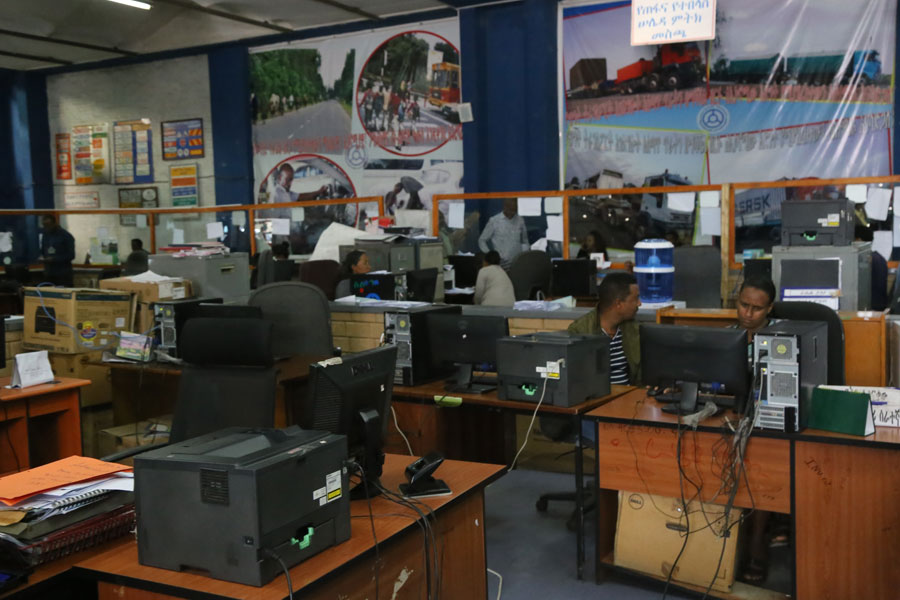
Featured | Feb 02,2019
Four types of agricultural produce will make their debut on the Ethiopian Commodity Exchange(ECX) trading floor, bringing the commodities traded to 15.
The addition of black pepper, fenugreek, black cumin seeds and coriander will be official this week, according to Netsanet Tesfaye, corporate communications manager for the ECX. Close to 3.5 million small-scale farmers sell their commodities through the Exchange.
Experts at the ECX embarked on a feasibility study two years ago. The findings were forwarded to an advisory panel and subject to a series of consultative meetings before the Ethiopian Commodity Exchange Authority gave the green light. The Exchange's officials say the move will improve the production and marketing systems associated with the spice trade and reduce high transaction costs brought on by the heavy involvement of intermediaries.
The high transaction costs have discouraged more than half a million smallholder farmers who cultivate spices on an average holding of less than half a hectare. Although large swaths of land are well suited for spice production, productivity remains low due to traditional farming practices. According to a recent survey conducted by the Ethiopian Statistical Service, Ethiopia produces over 240,000tn of 50 varieties of spices each year. However, spices account for under one percent of the 22.8 million hectares of farmland cultivated by 18 million small-scale farmers.
The majority of the production comes from the Oromia and Amhara regional states.
The average productivity of spices stands at 10 quintals a hectare, much lower than the average productivity of 36 quintals a hectare for grain crops.
Ayelege Alemu, a father of eight, lives in Takusa Wereda, Semien Gondar Zone in the Amhara Regional State. He cultivates spices and teff on one hectare of land. Last Mehir season, he harvested and sold 11 quintals of black cumin at 36 Br a kilogramme.
“We've no option but to sell our products to wholesalers at a lower price,” he told Fortune.
International market prices for black cumin go for 2.4 dollars (a little over 120 Br at official exchange rates) a kilo, while the commodity can fetch as much as 240 Br in local markets.
The inclusion of the commodities will have a profound effect on productivity by increasing farm gate value and reducing transactional costs, says Anwar Mohammed, an expert who specialises in the commodity market.
The ECX has come a long way since it was established in 2008 under the stewardship of Eleni Gebremedhin (PhD). In the early days, only three commodities were traded before growing to five over four years, when trade volume also grew to over half a million tons. The ECX continued to expand, incorporating six additional commodities during the tenures of three successive leaders. Under the leadership of the fourth and current CEO, Wondimagegnehu Negera, who assumed the position in 2017, the trade volume reached 614,586tn, worth 39.6 billion Br last year.
The Exchange operates 62 warehouses with a combined storage capacity of 400,000tn.
The poor quality of spices is also a major challenge faced by exporters.
Anwar says quality improvement is the primary incentive to include the added commodities. Black cumin, mainly sourced from farms in Bale and Gonder, has quality levels of 76pc and 85pc, respectively, according to the consultant.
“Quality will improve dramatically when they're traded through ECX," said Anwar.
Elsa Habte is a major shareholder and general manager of Fasika Spice & Baltina. Incorporated in 1992 with 50,000 Br in initial capital, the company has been exporting spices for the last two decades. Last year, it shipped four containers of processed herbs and spices worth 450,000 dollars, mainly to Europe.
Elsa believes spices, among the most widely traded commodities internationally, can expand and diversify Ethiopia’s export portfolio.
Earnings from the export of spices have been on a steep decline, down to 8.5 million dollars last year from 50 million dollars five years ago. A little more than 60pc of these commodities are shipped to markets in Asia, while around a third is exported to 11 African countries. India, the world's leading producer of spices, is also the top importer from Ethiopia, with a 28pc share of annual export earnings.
“The inability to meet quality standards is the major reason for the slump in export revenues,” Elsa said.
Established in 2008, the Ethiopian Coffee & Tea Authority is the government office in charge of developing the coffee, tea and spice industries. Four months ago, it finalised a directive targeted at modernising spice production, exchange, and marketing. It will ban the trading of spices outside the primary and secondary markets, designated by the Authority. It also proposes setting a minimum capital threshold for exporters, starting from 250,000 Br, as well as allowing farmers to obtain export permits.
It will be sent to the Ministry of Justice for verification this week, disclosed Tatek Girma, director of market development and promotion at the Authority. The Authority is considering introducing a platform that would link spice farmers and exporters directly, cutting intermediaries out, according to Tatek.
Commonly known as vertical integration, the Authority has been implementing the initiative in the coffee supply chain since 2017. However, the practice, which allows exporters to buy coffee directly from farmers or suppliers without going through the ECX, began to take off last year.
Vertical integration was responsible for nearly half of the 248,000tn of coffee exported from Ethiopia last year, generating 907 million dollars.
PUBLISHED ON
Feb 05,2022 [ VOL
22 , NO
1136]

Featured | Feb 02,2019

Radar | Nov 21,2020

Radar | Jun 07,2020

Fortune News | Mar 14,2020

Radar | May 25,2024

Viewpoints | Jun 08,2024

Commentaries | Aug 03,2024

Editorial | Sep 10,2022

Commentaries | Apr 06,2024

Fortune News | May 23,2021

Dec 22 , 2024 . By TIZITA SHEWAFERAW
Charged with transforming colossal state-owned enterprises into modern and competitiv...

Aug 18 , 2024 . By AKSAH ITALO
Although predictable Yonas Zerihun's job in the ride-hailing service is not immune to...

Jul 28 , 2024 . By TIZITA SHEWAFERAW
Unhabitual, perhaps too many, Samuel Gebreyohannes, 38, used to occasionally enjoy a couple of beers at breakfast. However, he recently swit...

Jul 13 , 2024 . By AKSAH ITALO
Investors who rely on tractors, trucks, and field vehicles for commuting, transporting commodities, and f...

Jun 28 , 2025
Meseret Damtie, the assertive auditor general, has never been shy about naming names...

Jun 21 , 2025
A well-worn adage says, “Budget is not destiny, but it is direction.” Examining t...

Jun 14 , 2025
Yet again, the Horn of Africa is bracing for trouble. A region already frayed by wars...

Jun 7 , 2025
Few promises shine brighter in Addis Abeba than the pledge of a roof for every family...